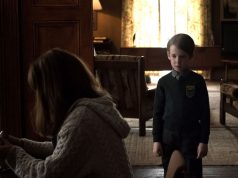You wouldn’t give “Caramel” a second thought if it were an American film. It’s a cute and unsubstantive light comedy about a group of women who work at a beauty parlor, with particular emphasis on their romantic lives; it’s basically the Lebanese equivalent of “Steel Magnolias” or “Beauty Shop.” Or “Designing Women.” Or “The Golden Girls.”
Its Lebanese-ness does make it a little more interesting for American audiences, though, as daily life in Lebanon has some twists that United States residents don’t have to think about. A man and woman doing nothing more than sitting in a car together at night would not be cited for indecency here, for example. Nor must a woman prove she is married before she’s allowed to book a hotel room.
Loaded with sunny optimism despite those buzz-killing elements (and isn’t that kind of inspiring in itself?), “Caramel” starts with Layale (Nadine Labaki), the hapless and harried proprietress of a beauty salon. She is a frequent collector of parking tickets, and she regularly leaves work mid-day to tryst with her married lover. We never meet him, but we know he is a cad who will never leave his wife. Our inner best friend screams, “Girlfriend, leave that dog!”
One of Layale’s employees is Nisrine (Yasmine Elmasri), who is engaged to the upstanding Bassam (Ismail Antar). She is afraid to tell him she is not a virgin, a fact that can have dire consequences in this environment of religious fundamentalism. Then there is Jamale (Gisele Aouad), a single mom who wants to be an actress, and Rima (Joanna Moukarzel), who looks like Amy Sedaris and is, if her flirtations with a customer are any indication, a lesbian. (Yes, a Lebanese lesbian. You have no idea how long I’ve been waiting for this.)
Director Nadine Labaki, who also plays the lead role, puts the gals in a run-down part of Beirut (maybe all parts of Beirut are run-down), in the middle of a hot summer with frequent power outages — all the better to show how strong they are in times of adversity. (So strong, so beautiful — it’s like they’re, I don’t know, steel magnolias or something.) It may be a contrivance to stack the deck against them so heavily, but it’s effective. We like all of the women, we admire their good humor and tenacity, and we root for them. The film’s a crowd-pleaser, no question.
That’s not to say it doesn’t have its drawbacks. The screenplay (by Labaki and two others) really is a treasure trove of cliches and devices, right down to the decent fellow who’s been under Layale’s nose all the time but whom she ignored in her blind devotion to the unavailable married man. And has there ever been a movie like this where the mistress and the wife didn’t wind up meeting?
Groundbreaking it is not. But it follows the familiar path cheerfully enough, and it paints a vivid, movie-friendly picture of a woman’s life in Lebanon. The “you-go-girl!” brand of chick flick has an extra bit of resonance when it comes from such a place.
B- (1 hr., 35 min.; Arabic and French with subtitles; )





